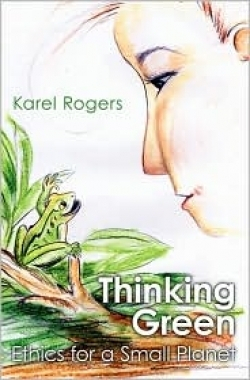Thinking Green
Ethics for a Small Planet
Activist and environmental researcher Karel Rogers’ book, Thinking Green, is a refreshing change from the multitude of “green” books about the environment. Instead of approaching the subject from a single narrow perspective, the author takes readers on a far-ranging philosophical journey aimed at changing the way mainstream America thinks about our planet. It is an eye-opening discussion that will likely lead to some serious introspection about our world, the role the reader plays in it, and the manner in which humans abuse it.
Rogers begins with a broad discussion of humans and their relationship to environmental problems, pointing out that, “we cannot make ethical decisions by ignoring all but one of the species on earth and by ignoring how things function in this ancient place nor by ignoring how our behaviors affect other species, societies, and ecologies around the globe.” Her discussion of “obligate consumption,” out of control spending, the widespread corporate focus on quarterly earnings, and planned obsolescence, each of which damages the planet in some way, unfortunately rings all too true.
The second section of this book is an attempt to “rethink core issues” in preparation for a different way of contemplating the earth’s problems. Rogers says it is the responsibility of humans to “live by nature’s operational rules” which embrace diversity and use “information rather than brute force to solve problems.” This section naturally flows into the next part. This is the bulk of the book, and it addresses the numerous challenges faced by mankind. Here Rogers covers such diverse areas as the over-fishing of the oceans, the use and abuse of land, humans’ unhealthy reliance on corn, the condition of the world’s soil and water, poverty, and war, which she labels a “uniquely human practice” and “an abuse of ethical/moral behavior.”
Finally, in section four, the author talks about how humans can achieve “freedom and prosperity.” Rogers suggests such strategies as “de-cluttering your life,” living close to where you work, purchasing Energy Star appliances, and eating “only those varieties of food that grow or live nearest to our homes.”
By the end of Thinking Green, Rogers recognizes that readers may be more overwhelmed than encouraged. “It’s easy to feel depressed and lose hope when we think about the severity of our social, economic, and environmental problems,” she writes. “But doing nothing is guaranteed failure.”
That, it seems, is the very point of the book. In Thinking Green, Rogers gives readers the background, perspective, tools, and hopefully the courage to do something daringly different—and potentially, to help change the relationship humans have with this very precious, very fragile planet.
Reviewed by
Barry Silverstein
Disclosure: This article is not an endorsement, but a review. The publisher of this book provided free copies of the book and paid a small fee to have their book reviewed by a professional reviewer. Foreword Reviews and Clarion Reviews make no guarantee that the publisher will receive a positive review. Foreword Magazine, Inc. is disclosing this in accordance with the Federal Trade Commission’s 16 CFR, Part 255.

